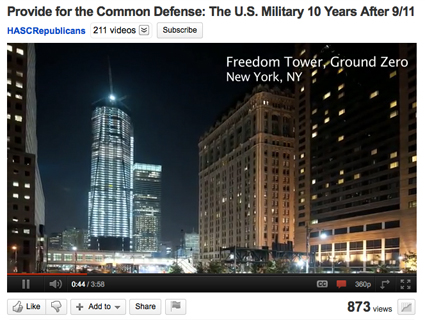Also read David Corn on how surprisingly little our politics have changed following 9/11.
Privacy, Profiling, and Free Speech
|
Law change |
What it means |
|---|---|
|
The FISA Amendments Act of 2008
|
Allowed the Foreign Intelligence Surveillance Court to authorize warrantless surveillance of Americans’ international electronic communications. In 2005, the New York Times reported on the Bush administration’s secret wiretapping of American citizens since 9/11. Civil liberties advocates were outraged, but it didn’t stop Congress from passing this law in 2008 essentially legalizing certain aspects of the system. Under the new law, for the first time since the inception of the modern legal framework governing surveillance, the government can intercept Americans’ international communications without a warrant as long as one party to the communication is “reasonably believed” to be outside the US. |
|
USA PATRIOT Act of 2001
|
Authorized “sneak and peak” searches. “Sneak and peak” search warrants allow the government to search your home or business without telling you about it until months later. Although national security concerns were the stated justification for this authority, these warrants are issued overwhelmingly in drug cases, with less than 1 percent used for terrorism cases. |
|
USA PATRIOT Act of 2001
|
Expanded the authority of the FBI to issue National Security Letters (NSL) requesting information from and about Americans. NSLs can compel banks, internet service providers, and other third parties to secretly reveal your personal information. No judicial approval is required, and the FBI need only certify that the requested information is “relevant” to a terrorism investigation (a much lower standard than under previous law). The number of NSLs has doubled in the last two years, and the Justice Department’s Inspector General has found widespread abuse of this law enforcement tool. |
|
USA PATRIOT Act
|
Criminalized pure speech in furtherance of the non-criminal acts of terrorist groups. The USA PATRIOT Act expanded 18 USC. § 2339, which criminalizes giving “material support” to terrorists, to include “expert advice or assistance” as a prohibited form of “support.” Under previous Supreme Court precedent, pure speech could be criminalized only if it had the intent and likely effect of furthering a group’s illegal aims. In 2010’s Holder v. Humanitarian Law Project, however, the Supreme Court held that the First Amendment permitted criminalization, under the “material support” law, of efforts to provide advice to members of a terrorist group on how to use international law and other non-violent conflict-resolution mechanisms. |
|
Intelligence Reform and Terrorism Prevention Act of 2004 |
Authorized the Department of Homeland Security to develop a “strategic plan” for airport security measures. The new plan called for the TSA to improve and deploy equipment that detects weapons and other objects in airports. Beginning in March 2010, TSA began employing some 450 full body scanners, which display an image of the passenger’s body underneath his or her clothing. Despite continued outrage from passengers, the D.C. Circuit of Appeals ruled in July 2011 that the use of scanners did not violate the 4th Amendment, which guards against unreasonable searches and seizures. |
|
US Customs and Border Protection and Department of Homeland Security Policy Changes
|
Allowed suspicionless searches of documents and electronic devices carried by US citizens returning from overseas travel. Before this change, a government directive allowed customs officials to read documents or papers belonging to Americans returning from overseas travel only if there was a reasonable suspicion that a US law had been violated. The new policy, introduced by the Bush administration and followed by the Obama administration, allows government officials to search any documents or papers, including the entire contents of laptops and other electronic devices, without any suspicion of wrongdoing. |
|
Attorney General Guidelines for Domestic FBI Operations, 2008
|
Domestic FBI operations have expanded dramatically since 9/11. Intrusive investigations are now permitted based on less evidence of wrongdoing than in the past. The 2008 Attorney General Guidelines for Domestic FBI Operations, in particular, allow the FBI to conduct “assessments” using techniques such as informants, “pretext interviews” in which an agent surreptitiously questions an individual, and 24-hour physical surveillance—even in the absence of any factual predicate for the investigation. |
|
FBI Domestic Investigations and Operations Guide, 2008
|
Allowed ethnic profiling. The FBI’s 2008 domestic investigations guide institutionalized suspicion of Muslim Americans by allowing the FBI to map “locations of concentrated ethnic communities” and “ethnic-oriented businesses and other facilities” as permissible means of gathering information about potential terrorism. The FBI has reportedly conducted such mapping in cities with concentrated Muslim populations in California, Michigan and Minnesota. |
Detainee Policy
|
Law change |
What it means |
|---|---|
|
Military Commissions Act of 2006
|
Established the practice and limits of indefinite military detention at Guantánamo Bay. After 9/11, the US began an unprecedented practice of holding so-called “enemy combatants” in military detention without charge and without according them the status or rights of prisoners of war. The Supreme Court essentially upheld this practice in 2004. But in the Hamdi and Rasul decisions of 2004 and again in 2008 with Boumediene v. Bush, the Court ruled that Guantánamo detainees were entitled to bring habeas corpus petitions in US courts to challenge whether they were properly found to be “enemy combatants.” Although President Obama pledged to close the prison at Guantánamo Bay, Congress has enacted laws prohibiting the transfer of detainees to the US and imposing obstacles (that are in some cases insurmountable) to transferring detainees to other countries. Moreover, regardless of whether the prison is closed, the Obama administration has determined that it will continue to hold several of the men currently at Guantánamo without trial because the evidence against them is either insufficient or tainted by torture. |
|
Military Commissions Act of 2006
|
Authorized military tribunals for enemy combatants. Following a Supreme Court ruling that the military commissions established unilaterally by the Bush administration were illegal, Congress passed the Military Commissions Act in 2006. The Act authorized “trial by military commission” for enemy combatants and left out basic procedural protections that are mandatory in civilian criminal court. In one of his first acts following his inauguration, President Obama effectively suspended the use of military tribunals. But he worked with Congress to devise a new Military Commissions Act that restored only some of the procedural protections that the 2006 Act omitted. In the spring of 2011, after Congress blocked the transfer of detainees to the US for civilian trial, the Obama administration officially reinstated military tribunals for prosecution of Guantánamo detainees. |
|
Torture
|
The Bush administration jumped through hoops to authorize the use of torture, which it referred to as “enhanced interrogation techniques.” Its lawyers issued secret legal opinions designed to get around the prohibition on torture by redefining what torture meant and claiming that the laws against torture didn’t apply to the President acting as Commander in Chief. When the details of the “enhanced interrogation techniques,” such as waterboarding, surfaced, human rights advocates cried foul. President Obama has taken a firm stance in banning the use of torture by US military and intelligence officials. But as the debate over whether torture led us to Osama Bin Laden’s hideout showed, America’s commitment to the laws banning torture may well be wavering. The Obama administration must share some of the blame for that: It has refused to allow any inquiry into the Bush administration’s systematic approval of torture; it has asserted an overbroad version of the state secrets privilege to prevent lawsuits that would expose torture; and it continues to employ the practice of rendition — sending detainees to other countries where they are likely to be tortured. |











